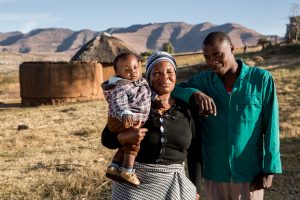News from the COVID-19 Front Lines in Africa
On World Health Worker Week, m2m President & CEO, Frank Beadle de Palomo, celebrates the women m2m employs as frontline health workers and shares an update on how COVID-19 is impacting the work of Mentor Mothers in Lesotho, one of the nine African nations in which we operate.
For almost 20 years, mothers2mothers (m2m) has been on the frontlines of a pandemic—HIV/AIDS—which has had a significant impact on our home continent of Africa. Today, we find ourselves at the frontlines of another pandemic in Africa—COVID-19. And, the two, along with nearly endemic tuberculosis, are intertwined—people living with HIV who are unaware of their status, or are not on effective treatment, are believed to be at increased risk of complications should they contract COVID-19. This means that—even as we adapt our work and take the fight to COVID-19 directly—our ongoing work to ensure everyone knows their HIV status and that those who are living with HIV are on effective treatment, is now more important than ever. We are optimistic that our proven model will deliver impact, but under-resourced health systems and anecdotal evidence of de-prioritised HIV patients are indicators of how hard this battle will be.
This World Health Worker Week (5-11 April 2020), m2m is proud to pay tribute to the nearly 1,800 women we employ as Mentor Mothers and Peer Mentors who are working on the frontlines as COVID-19 rapidly spreads across the African continent. Eight of the nine African countries in which we operate have reported COVID-19 cases. In countries on full lock down (Angola, Lesotho, and South Africa), our frontline staff have been designated as essential health workers. They report for duty during lockdowns, bolstering understaffed health centres and supporting vulnerable populations in accessing health services.

Limpho Nteko from Lesotho
To paint a picture from the frontlines, here are some insights from Limpho Nteko, of Lesotho. Limpho, 29, is a former m2m client and Mentor Mother and until last month, served as a Regional Manager supervising 90 Mentor Mothers. (This month, Limpho started a new, office-based role as a Monitoring and Evaluation Officer.) While Lesotho has not yet reported any confirmed cases of COVID-19, the country went on lockdown just over a week ago as a precautionary measure. Limpho says the fact that people in Lesotho have not seen any cases yet, combined with a widespread lack of understanding about the virus, has led many people to be confused and not take the situation seriously.
“I think the challenge is that people in Lesotho still do not know the truth behind COVID-19. Just like with the AIDS pandemic that hit our country so hard, you need to follow the guidelines to reduce your risk of infection. In the case of COVID-19, we must practice social distancing, use good hygiene, and wash our hands,” Limpho says. Yet, she adds, not everybody is complying with them.
As in the other countries where we work, Limpho says m2m has spent the last few weeks in Lesotho educating our frontline staff about COVID-19 and how to protect themselves, so they can stay safe and share this critical information with their clients. This has been done through meetings, posters, voice notes on WhatsApp, and other creative and resourceful ways. We are procuring hand sanitiser, and are ensuring that frontline staff have masks and other protective gear.
Mentor Mothers are no longer going door-to-door in communities in order to reduce the risk of COVID-19 exposure for both themselves and their clients. Instead, they are providing one-on-one education and support in safe settings at the health centres, observing social distancing guidelines, and following up with clients in the community by phone to make sure they are adhering to treatment and accessing the health services they need. Working shifts have also been adjusted to ensure clinics are not over-crowded.
According to Limpho: “When the Mentor Mothers in Lesotho first realised they would continue going to work during the lock down and be part of the team of essential health workers, most of them were worried. But they were put more at ease when they saw they have protective gear and other safeguards in place. They are all very concerned about the health of their clients, and they understand how important their services are right now to keep families and communities safe and healthy.”

m2m clients in Linakeng, Lesotho
Limpho says Mentor Mothers are keeping a close eye on making sure their clients are getting the services they need and nobody is being left behind. For example, they recently noticed that some clients were sent home without their refills for HIV treatment because the health centres have been so focused on preparing for the pandemic. “That’s clearly a big worry for us because our goal is to make sure our clients adhere to their treatment—if they cannot, they are at greater risk. We have been going through our records to see which clients did not get treatment, and we are working with nurses to make sure that such clients are followed up by phone to come for their treatment,” she says.
As for Limpho herself, she says she is taking things one day at a time and doing her best to protect her family. Like many working parents who have suddenly found themselves sharing work space with their children, she is figuring out how to care for her family while staying on top of her responsibilities for m2m. One of her strategies, to which I’m sure many of us can relate: “Every time I have to get something done, I lock the bedroom door and hide there.”
If you would like to show your appreciation for m2m Mentor Mothers and support their efforts to keep their clients safe and healthy at this unprecedented time, please donate here.






















